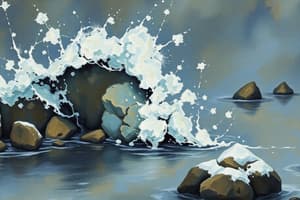Podcast
Questions and Answers
What are the four processes involved in a change in state of matter?
What are the four processes involved in a change in state of matter?
- Melting, boiling, evaporation, condensation
- Melting, freezing, condensation, evaporation
- Melting, freezing, boiling, evaporation (correct)
- Freezing, boiling, evaporation, condensation
What are the two ways to dissolve substances in water?
What are the two ways to dissolve substances in water?
- Stirring, increasing temperature (correct)
- Decreasing the size of particles, dilute solution
- Concentrated solution, stirring
- Increasing temperature, decreasing the size of particles
What is the difference between physical and chemical changes?
What is the difference between physical and chemical changes?
- Physical changes can be observed in daily life, while chemical changes cannot.
- Physical changes are reversible, while chemical changes are irreversible.
- Physical changes involve a change in state of matter, while chemical changes involve dissolving substances in water.
- Physical changes involve a change in the size of particles, while chemical changes involve a change in state of matter. (correct)
Flashcards are hidden until you start studying
Study Notes
Changes in State of Matter
- Four processes involved in a change in state of matter: melting, freezing, evaporation, and condensation
- Melting: change from solid to liquid state (increased temperature)
- Freezing: change from liquid to solid state (decreased temperature)
- Evaporation: change from liquid to gas state (increased temperature or surface area)
- Condensation: change from gas to liquid state (decreased temperature or surface area)
Dissolving Substances in Water
- Two ways to dissolve substances in water: mechanical mixing and dissolution
- Mechanical mixing: blending or stirring of substances to create a mixture
- Dissolution: dissolving of substances in water to create a solution
Physical and Chemical Changes
- Physical changes: involve a change in state or physical properties, but not composition
- Chemical changes: involve a change in composition, forming new substances
- Key difference: physical changes are reversible, chemical changes are irreversible
Studying That Suits You
Use AI to generate personalized quizzes and flashcards to suit your learning preferences.



